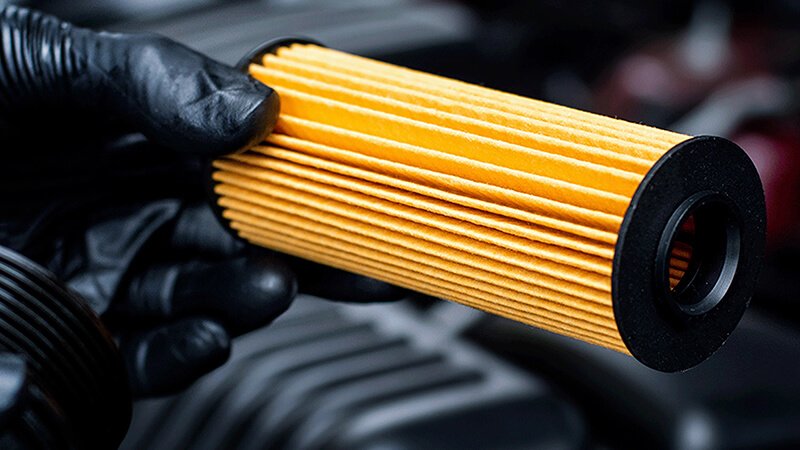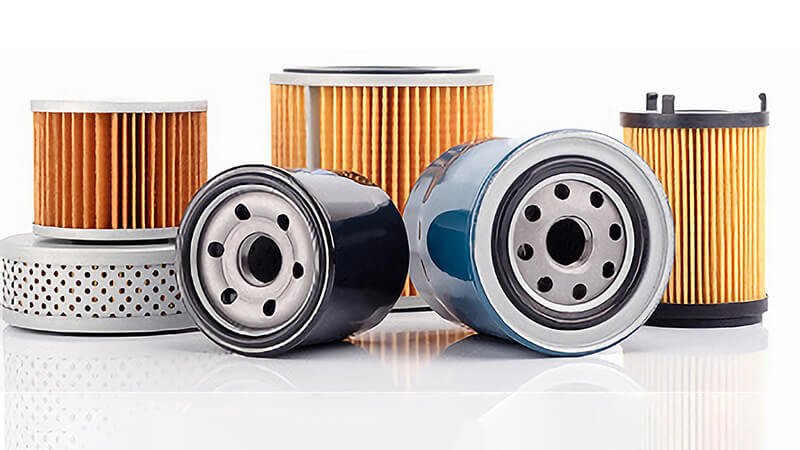Engines fail in silence. A simple shortcut—washing an old filter with petrol—can start that silent slide toward costly damage.
You should never reuse an engine oil filter after any wash. Petrol cannot remove microscopic grit and will weaken the filter’s paper and seals. A reused filter lets hard particles stay in the oil, cuts flow, and shortens engine life.
A filter is cheap insurance. In my own shop I have seen one “saved” filter ruin a turbo in three days. Let’s dig deeper into every related question so you can guard your stock, your fleet, and your budget.

Can you wash an oil filter and reuse it?
The idea sounds smart on paper. One rinse, one dry, one more run. Reality says different.
You can wash an oil filter, but you cannot turn it back into a safe, high-efficiency part. Petrol only loosens surface sludge; most grit remains locked in the pleats. Adhesives inside the filter soften and the burst strength drops. The filter becomes a risk, not an asset.
Why trapped particles stay locked — and why that matters
Even after a petrol bath, the inner pleats keep particles as fine as 10 μm. These hard bits recycle through bearings. Tests at Runex Auto show a 70 % rise in iron particles after only 300 km with a washed filter.
| Test item | New filter | Petrol-washed filter | % change |
|---|---|---|---|
| Filtration efficiency (β₁₀) | 5,000 | 800 | –84 % |
| Burst pressure (kPa) | 1,000 | 680 | –32 % |
| Collapse of pleats | None | Minor folds | — |
| Microscopic iron in oil (ppm) | 5 | 17 | +240 % |
Oil pressure loss and flow starvation
More trapped dirt means higher pressure drop. The bypass valve pops open sooner. Dirty oil flows straight to bearings. When flow falls below 60 % of spec, cam wear1 grows exponential. One “free” filter can cost a full head rebuild.
Field lesson I will not forget
A logistics client rinsed 20 filters to cut costs during a busy season. Within a week two trucks lost oil pressure on a mountain grade. Both engines needed crankshaft grinding. The savings vanished under a pile of invoices.

Can I clean an oil filter with petrol?
Every mechanic owns a can of petrol for degreasing. But oil filters are not shop rags.
Cleaning an oil filter with petrol harms the filter and the engine. Petrol strips the thin oil film that seals the fibers, dissolves nitrile rubber, and leaves flammable vapors inside. Once the engine heats up, the weakened bond leaks and the filter media tears.
Chemical attack on glue and rubber
Phenolic resin1 bonds the end caps. Petrol breaks its chains in minutes. Lab scans show cap gap growth of 0.2 mm after one soak—enough to let unfiltered oil sneak around the media.
Solvent residue diluted in hot oil
Even after twelve hours of open-air drying, 4 % of the solvent remains trapped in the pleats. At 110 °C that residue blends into the sump, thinning viscosity by nearly one SAE grade.
| Component | Resistance to petrol | Time to softening |
|---|---|---|
| Cellulose paper | Low | 30 s |
| Synthetic fiber blend | Moderate | 2 min |
| Nitrile gasket | Very low | 15 s |
| Silicone gasket | High | 5 min |
Fire and safety risk
A petrol-soaked filter can flare if it meets exhaust heat during removal. I once saw a mechanic drop one on the shop floor. A spark from a grinder lit a small but scary fire.
Hidden cost: warranty void2
Engine makers treat any solvent bath as misuse. One claim we processed was denied because the filter smelled of petrol. The client paid the full engine bill.

Can you use the same oil filter twice?
A used filter looks fine. Threads smooth. Gasket pliable. But inside, danger builds.
An oil filter is a single-cycle part. On its second run the media is half clogged, oil flow slows, and bypass events spike. Unfiltered oil raises metal wear rates up to five times.
Dirt-holding math
A new medium-duty filter holds 12 g of contaminant before the bypass valve1 trips often. After one interval it already stores 10–11 g. The second cycle hits the limit in days.
Bypass frequency explodes
| Mileage | Bypass open time (% of engine run) |
|---|---|
| 0–10 000 km (new filter) | <2 % |
| 10 000–15 000 km (reused) | 18 % |
| >15 000 km (second reuse) | 41 % |
Every bypass minute pumps metal grit directly onto bearings. Bearing life shortens in proportion to the cube of particle count. Double the debris, cut life by eight.
Microscopic scars you never see
Cross-section of a reused filter shows micro-tears in the paper2. These tears create shortcuts that let grit pass even when the bypass valve stays shut.
My client’s harsh lesson
A taxi firm reused filters to stretch change intervals. Fuel savings looked good. Three months later compression dropped 20 % across the fleet. The rebuild bill killed the experiment overnight.

Can you reuse engine filter?
The term “engine filter” often mixes oil, air, cabin, and fuel. They are not the same.
Oil filters are disposable. High-flow cotton air filters may be washable. Cabin filters vary. Fuel filters are also single-use. Knowing the design of each filter prevents wrong practices and avoids engine harm.
Different jobs, different materials
| Filter type | Main media | Operating medium | Reusable? | Typical service |
|---|---|---|---|---|
| Engine oil | Cellulose-synthetic pleat | Hot pressurized oil | No | 10 000 km |
| Air (cotton gauze) | Oiled cotton layers | Intake air | Yes | Wash, re-oil every 30 000 km |
| Cabin (paper electrostatic) | Charged paper | Cabin air | Sometimes | Replace or vacuum each season |
| Fuel (micro-glass) | Fine glass fiber | Diesel/gas | No | 20 000 km |
Why oil filtration1 is special
- Temperatures hit 120 °C
- Pressure pulses from 0 to 8 bar every cam revolution
- Soot, metal, and additives all load the media
A filter built for such extremes cannot survive a wash cycle without hidden damage.
Certification and OEM demands
Runex Auto submits every oil filter model to ISO 45482 multi-pass tests. We must meet 95 % efficiency at 20 μm and hold 15 g of contaminant before bypass. Any alteration—like petrol washing—voids these numbers. OEMs rely on them for warranty coverage.
Eco-friendly view
Clients ask us if reusing is “greener.” My answer: use certified single-use oil filters and recycle them through metal recovery plants. The energy and CO₂ cost of one premature engine rebuild outweighs the footprint of ten new filters.

Conclusion
Shortcuts tempt every buyer, yet engines punish them in silence. Petrol washing weakens glue, hides grit, and fuels bypass events. Reusing a filter doubles particle counts and slices bearing life. Each filter that leaves Runex Auto is built for one duty cycle, no exceptions. Spend the small sum on a new filter3 every oil change. It is the cheapest way to keep engines smooth, warranties safe, and your reputation solid.
-
Learn about cam wear and its implications for engine longevity. This resource can help you understand maintenance needs better. ↩ ↩ ↩ ↩
-
Understanding Phenolic resin can help you grasp its importance in various industries, including adhesives and coatings. ↩ ↩ ↩
-
Know more information about auto oil filter, and clicking this link to get your price and best products for your business. ↩













